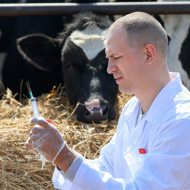Consultation opens on risk classification of veterinary antimicrobials

The updated categorisation includes additional criteria, such as the availability of alternative antimicrobials.
The European Medicines Agency (EMA) has opened a public consultation on the risk classification of antimicrobials used in animals.
The consultation follows the publication of updated scientific advice on the impact of veterinary antimicrobials on public and animal health. Once finalised, it will help decision-makers in the EU create guidelines for use of antimicrobials in veterinary medicine.
Prepared by the Antimicrobial Advice Ad Hoc Expert Group (AMEG), the update considers the experience gained since the categorisation of antimicrobials was first published in 2014.
In the 2014 classification, three categories were proposed for the classification of Critically Important antimicrobials. These are defined by the World Health Organisation as the most relevant for human health.
The updated categorisation considers all classes of antimicrobials and includes additional criteria, such as the availability of alternative antimicrobials in veterinary medicine. It is comprised of four categories (A-D), of which each are accompanied by an action word for clarity:
• Category A (“Avoid”) includes antimicrobial classes not currently authorised in veterinary medicine in the EU. For these medicines, their use in food-producing animals is prohibited and they may be given to individual companion animals only under exceptional circumstances.
• Category B (“Restrict”) refers to quinolones, 3rd- and 4th-generation cephalosporins and polymyxins. Use of these antimicrobials in animals should be restricted to mitigate the risk to public health.
• Category C (“Caution”) covers antimicrobials for which, in general, alternatives in human medicine in the EU exist, but in veterinary medicine there are only few alternatives in certain indications. These antimicrobials should only be used when there are no antimicrobial substances in Category D that would be effective.
• Category D (“Prudence”) is the lowest risk category. Antimicrobials belonging to this category can be used in animals in a prudent manner. This means that unnecessary use and long treatment periods should be avoided and group treatment should be restricted to situations where individual treatment is not feasible.
The consultation will remain until 30 April 2018. Comments should be submitted to vet-guidelines@ema.europa.eu using this template.



 The Veterinary Medicines Directorate (VMD) is inviting applications from veterinary students to attend a one-week extramural studies (EMS) placement in July 2026.
The Veterinary Medicines Directorate (VMD) is inviting applications from veterinary students to attend a one-week extramural studies (EMS) placement in July 2026.